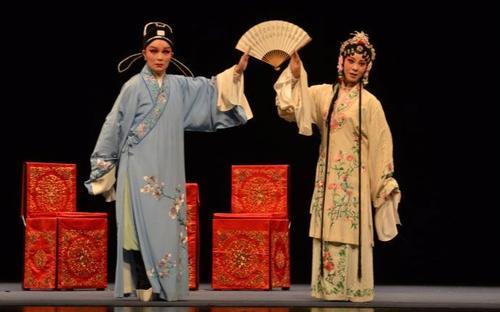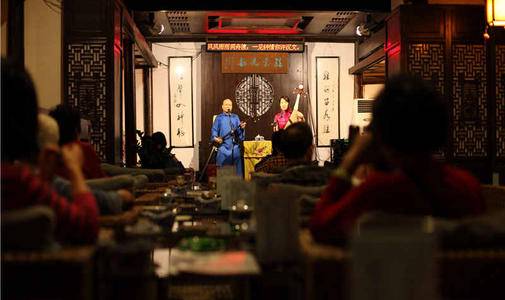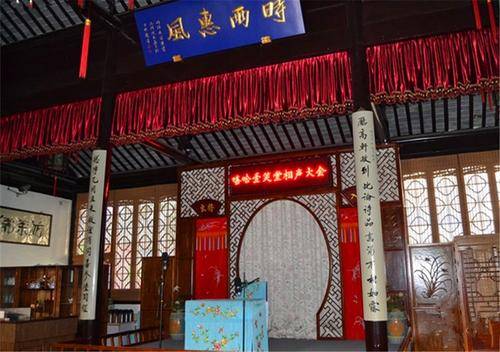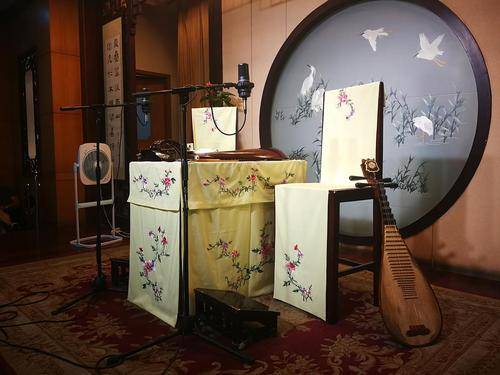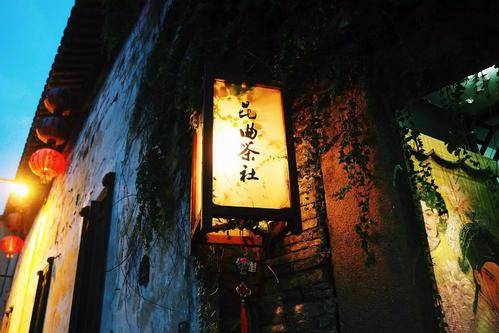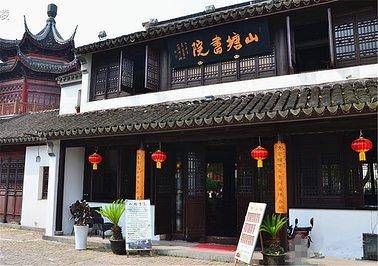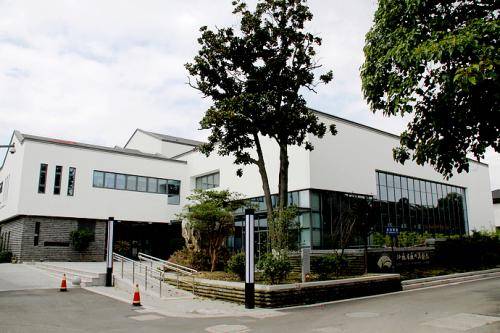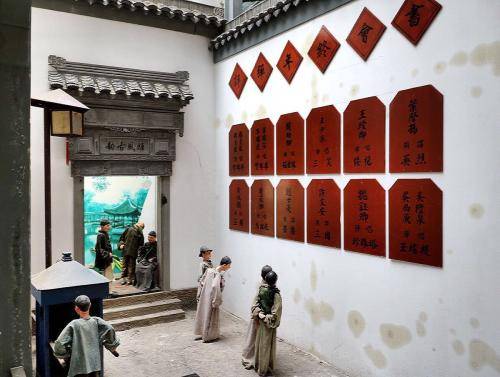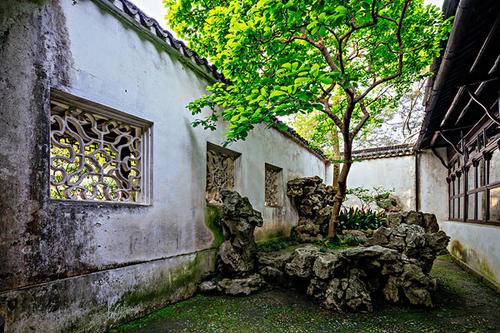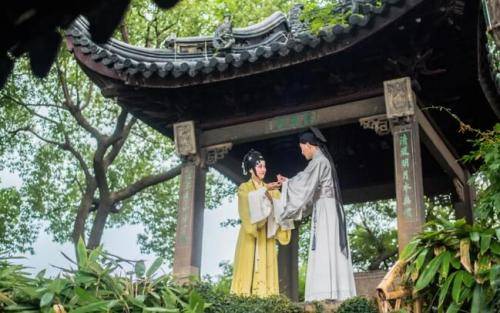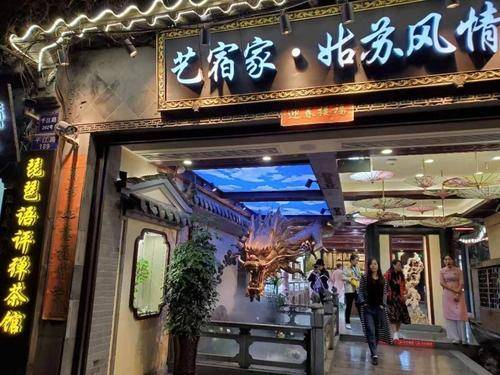Taste of Shantang Pingtan Book House
The environment is very good, with an antique charm. The tea is nice, and candied fruits are provided. You need to refill the water yourself. The price of Pingtan varies from 40 to 100 yuan. You get one free song for every three songs you order. There are real-time subtitles, so even if you don't understand Suzhou dialect, you can still enjoy it. The performers are very professional and dedicated. The landlady is the original singer of the theme song of 'The Flowers of War', but she doesn't perform often. The service attitude is very good, and it tends to be more crowded on Sundays.
Lanya Quyuan Theater
Lanya Quyuan Theater is located at No. 38 Daru Lane in the famous Pingjiang Historical Block, known as the 'miniature of the ancient city of Suzhou'. It is east of Pingjiang Road and west of Guanqian Street. The theater is designed in a garden style with winding corridors, shadowy flowers, and tree tops, creating a very elegant and pleasant environment outside the hall. The stage and the interior environment are simple and serene, making it an ideal place for enjoying tea and listening to music. Lanya Quyuan has a rich cultural heritage and is also the former site of the ancient Zhaoqing Temple. Here, you can appreciate authentic traditional garden-style Suzhou Kunqu Opera. Enjoy Kunqu Opera, listen to Pingtan, hear the guqin, savor fragrant tea, taste Suzhou cuisine, and get up close with panoramic classical arts like Kunqu Opera. Lanya Quyuan is the top choice. Visiting Suzhou without touring Tiger Hill is a regret, and visiting Suzhou without listening to Kunqu Opera is a great regret.
Guangyu Book Hall
The predecessor of Guangyu Book Hall was a guild organization of Suzhou Pingtan artists, originally named 'Guangyu Guild Hall', built in 1776 (the 41st year of Qianlong). In 1912, it was renamed 'Guangyu Society', meaning 'to glorify the past and benefit the future'. Now, the gate tower from the Guangxu period of the Qing Dynasty, the commemorative stone pillar for the 150th anniversary of its establishment, and the stele corridor displaying the history of Pingtan are all well preserved. Guangyu Society laid the foundation for improving the status of Pingtan artists and the development of Pingtan art. It is the earliest established guild organization in the Pingtan community, with the most participating actors, the longest existence, and the greatest impact on the development of Pingtan art. Over the past two hundred years, Guangyu Society has produced many famous artists and various schools of thought, earning the reputation of 'a thousand miles of book sounds come from Guangyu'.
Located on Shantang Street, the environment is quaint with good lighting effects. During the intervals between different scenes, a projection screen is lowered to explain some history of Kunqu Opera, giving people a dreamlike feeling, as if they were in another world. Shantang Kunqu Opera House performs classic Kunqu Opera excerpts every day, occasionally interspersed with Suzhou Pingtan, Guzheng performances, comedy shows, and other traditional and modern programs rich in Gusu charm.
At Shantang Academy, you can enjoy tea while listening to Kunqu opera, read books to pass the time, and appreciate the architecture, which is also worth admiring.
Kunqu Opera House
Suzhou Kunqu Opera House is located near Taohuawu, close to the former residence of Tang Bohu. In recent years, the continuous production of Kunqu opera masterpieces such as 'The Peony Pavilion' and 'The Palace of Eternal Life' has brought Suzhou Kunqu Opera House back into the limelight. Inside the opera house, there is also the Lanyun Theater, which is not frequently used for performances and is mainly used for troupe rehearsals.
Suzhou Pingtan Museum houses more than 12,000 precious historical materials related to Pingtan, including hundreds of rare and original scripts. The exhibits mainly consist of historical artifacts and audiovisual materials of Pingtan, combined with modern technology to recreate and showcase the characteristics of famous Pingtan artists, schools, and performances.
Master of the Nets Garden is a typical Suzhou garden. Although its area is less than one-sixth of the Humble Administrator's Garden, its clever layout makes the small bridges, flowing water, pavilions, and towers not feel cramped. It is a model of 'seeing the big in the small.' Besides understanding the intricacies of the layout, enjoying traditional Chinese opera performances during the annual night garden opening is another major highlight here.
Canglang Pavilion Kunqu Floating Life Six Records
'Floating Life Six Records' is an autobiographical prose written by Suzhou literati Shen Fu in the 13th year of Jiaqing (1808) during the Qing Dynasty. The protagonist Shen Fu recalls his life born in a literati family by the Canglang Pavilion in the south of Gusu City, where he first met his cousin Chen Yun and fell in love. They later married, and the couple lived harmoniously and deeply in love. They did not conform to worldly conventions and found joy in hardship. After Yun's death from illness, Shen Fu wandered away from home and wrote 'Floating Life Six Records' to console his longing for his deceased wife.
Pipa Language Pingtan Art Museum
Pipa Language Pingtan Art Museum is located at No. 202, Pingjiang Road Historical Block, Suzhou Ancient City. With winding paths leading to secluded spots, a retro small building, and a unique atmosphere, visitors can enjoy tea while listening to the sounds of Suzhou.
